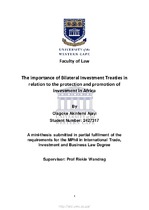| dc.contributor.advisor | Wandrag, Riekie | |
| dc.contributor.author | Ajayi, Olagoke Akinfemi | |
| dc.date.accessioned | 2020-02-19T11:42:56Z | |
| dc.date.available | 2020-02-19T11:42:56Z | |
| dc.date.issued | 2019 | |
| dc.identifier.uri | http://hdl.handle.net/11394/7135 | |
| dc.description | Magister Philosophiae - MPhil | en_US |
| dc.description.abstract | There is a growing concern around new patterns of negotiating international
investment agreements vis-a-vis the recent withdrawals from Bilateral Investment
Treaties (BITs) by developing countries. In recent times, the decision by a number of
countries withdrawing their BITs with their investment partners raises questions to
whether this investment instrument remains relevant in international investment
discourse, 1or simply creates a gap to be exploited by larger entities or economies.
The emergence of BITs became increasingly important within the framework of
International Investment Law when emerging nations acceded to be members of the
international community after World War II.2 Literature contends that emerging nations
had little evidence to show that BITs have stimulated additional investments in
developing countries, let alone revitalised domestic reforms during this era.3
Seemingly, these conditions are not peculiar to certain countries but cut across
geographical regions. | en_US |
| dc.language.iso | en | en_US |
| dc.publisher | University of the Western Cape | en_US |
| dc.subject | Protection | en_US |
| dc.subject | Promotion | en_US |
| dc.subject | Africa | en_US |
| dc.subject | Investment | en_US |
| dc.subject | Bilateral Investment Treaties | en_US |
| dc.title | The importance of Bilateral Investment Treaties in relation to the protection and promotion of investment in Africa | en_US |
| dc.rights.holder | University of the Western Cape | en_US |

